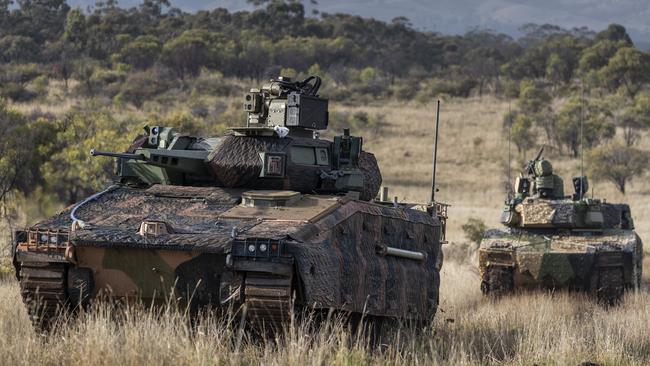AUKUS alliance: Something has to give to pay for it all
Programs to equip Australia with more armoured vehicles, frigates and combat aircraft could be cut in order for the government to fund the $368bn AUKUS project.

Programs to equip Australia with more armoured vehicles, frigates and combat aircraft could be cut in order for the government to fund the $368bn AUKUS project, which won’t result in submarines hitting the water for another decade.
Defence Minister Richard Marles on Tuesday revealed AUKUS would cost the nation $9bn over the forward estimates, with $6bn already offset.
However, the remaining $3bn will need to come out of the Defence Department’s long-term investment program.
“Obviously, the (Defence) Strategic Review has had a good look at all of that. It will be plain in time for the budget,” Mr Marles said.
The review, led by former Defence Force chief Angus Houston and former Labor defence minister Stephen Smith, is expected to be released by the middle of April.
Australian Strategic Policy Institute senior analyst Malcolm Davis said any move to limit capabilities in the near term in order to fund the submarine project – which won’t be realised until the 2030s – would be of concern.
“Given the huge cost of acquiring the nuclear submarines … if defence spending is not significantly boosted, then what you’re going to see in the DSR is a number of key projects cut,” Dr Davis said. “That would mean the DSR would be a wasted opportunity, because it would not deal with the threats that are going to happen in this decade, and that does concern me if that’s the case.”

Of the projects he predicted could be at risk, Dr Davis singled out phase three of the infantry fighting vehicle project – Land 400 – while the Hunter-class frigates could be cut or “delayed”.
“There has also been discussions about navy acquiring three additional air warfare destroyers and maybe corvettes,” he said. “Whether they see the light of day is another issue that could be open to question. Another possibility is that they could cancel additional purchases of the F35 (fighter jets).”
Dr Davis said given Australia no longer could rely on the long strategic warning times, it would not be wise to cut short-term capabilities to fund long-term projects.
“If we’re serious about responding to the challenges in the strategic environment then we need to be substantially boosting defence spending,” he said.
Strategic Analysis Australia director Michael Shoebridge said the Land 400 program and programs delivering tanks could be easily cut from the defence budget.
“We’re all seeing the land war fought in Ukraine, but there’s no land war that makes sense for Australia. So if the government was under pressure before to cut programs that don’t make sense for us, it should be under even more pressure now,” he said.








To join the conversation, please log in. Don't have an account? Register
Join the conversation, you are commenting as Logout